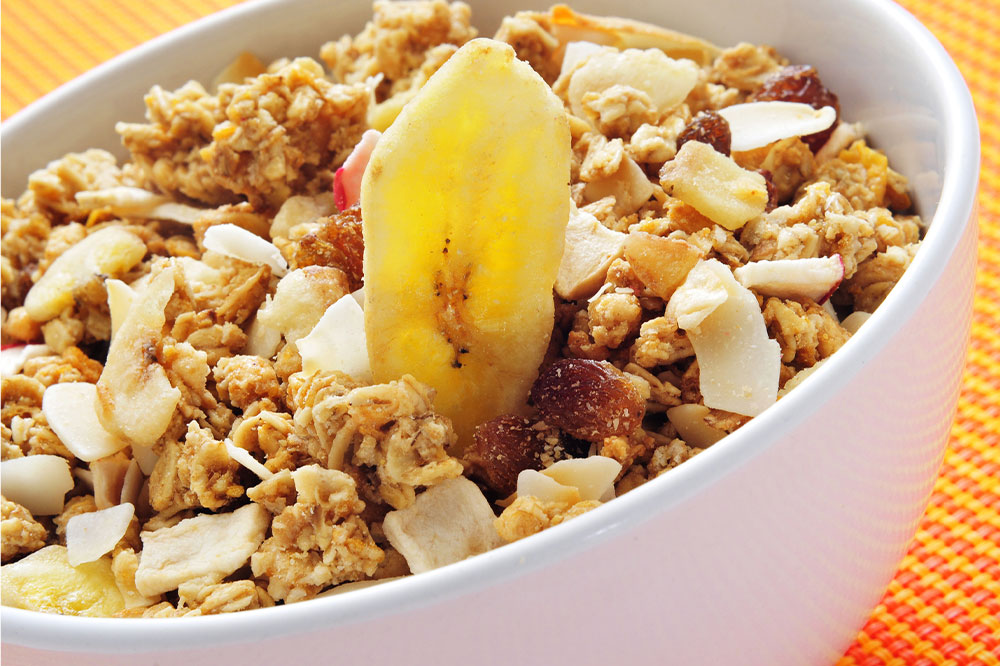13 foods that help manage Crohn’s disease symptoms

Crohn’s disease is an inflammatory bowel disease that can cause symptoms like a reduced appetite, diarrhea, and stomach pain. It affects the gastrointestinal system and can get aggravated by certain foods. So, treatment, along with lifestyle changes like better food choices, can help one manage the symptoms, reducing their severity and frequency. Here is a look at how nutrition plays a role in managing Crohn’s disease and foods that can ease associated symptoms:
Nutrition and Crohn’s disease
Crohn’s disease is a chronic inflammatory condition affecting the GI tract, also considered an autoimmune disorder. Here, the immune system accidentally attacks the lining cells in the digestive tract. For those with Crohn’s, monitoring and restricting trigger foods can help them cope with the disease. One can try an elimination food plan to remove one type of food at a time to identify the items the body cannot tolerate. However, while in remission, one can follow a well-rounded meal plan consisting of fruits, vegetables, proteins, and fat sources that improve overall health.
Top foods
There is no single meal plan that works for every individual with Crohn’s disease. So, here are a few healthy options that are best tolerated when dealing with the condition:
Low-fiber cereal
High-fiber food groups generally worsen Crohn’s symptoms and induce irritation in the intestine walls. So, when dealing with IBD, one should opt for low-fiber cereals, which will be gentle on the digestive tract without compromising nutritional needs.
Almond milk
Milk intolerance is one of the common issues in those with Crohn’s disease. So, one can opt for a healthy alternative like almond milk to enable smoother digestion. Almond milk is high in vitamins D and E and calcium, similar to regular milk. However, one should choose almond milk with no added sugars and less processed. Some other suitable alternatives are coconut milk and hemp milk.
Yogurt
Yogurt is one of the best foods that can ease Crohn’s symptoms. It is packed with probiotics (good bacteria) and provides an excellent boost to the body’s calcium levels. However, not all kinds of yogurt contain probiotics.
Fatty fish
Fatty or oily fish is rich in omega-3 fatty acids, which are important for digestive relief. In addition, the omega-3 fatty acids have anti-inflammatory properties to soothe the stomach, while their high protein concentration helps promote overall well-being.
Fresh vegetable juice
The insoluble fiber content in raw vegetables is known to trigger the symptoms of Crohn’s disease. However, veggies contain essential nutrients. So, as an alternative to raw vegetables, one can make fresh veggie juice to get rid of the fiber while retaining vitamins and minerals. The juice can contain carrots, apples, beets, leafy greens, and other veggies.
Avocados
Fruits like avocados are one of the healthiest foods that can ease Crohn’s symptoms. Avocados are easier to digest than other fiber-rich foods. They are also rich in vitamins B, E, and potassium and are good fat sources.
Bananas
Banana is relatively less fiber-rich than other high-fiber sources, making the fruit easier to digest when dealing with Crohn’s disease. Banana is also a potassium-rich fruit that can be easily added to smoothies and other recipes.
Apples
Apple peels are rich in fiber, which can make digesting them difficult for people dealing with an IBD. However, one can have peeled apples to get antioxidants, vitamins, and minerals in the fruit. In addition, one can opt for homemade applesauce to reduce flare-ups and ease digestion.
Eggs
Eggs are an excellent source of protein and are well-tolerated by most people with Crohn’s disease. One can opt for hard-boiled or soft-boiled eggs, omelets, or scrambled eggs, depending on their preferences.
Oatmeal
Oats make one of the top foods that can ease Crohn’s disease symptoms, as the grain is loaded with two critical prebiotics: polyphenols and beta-glucan. This makes oats gut-friendly and beneficial for those with inflammatory conditions. A cup of cooked oats contains 4 grams of soluble fiber, along with antioxidants and numerous minerals and vitamins, including thiamine and magnesium.
Potatoes
Potatoes are good sources of potassium, which helps maintain fluid balance in the body during a Crohn’s flare-up. However, one should opt for peeled potatoes as the skin contains insoluble fiber, which is difficult to digest when dealing with IBD. So, one can have mashed potatoes or peeled and baked white or sweet potatoes.
Cooked carrots
Cooked carrots can be a good addition to a Crohn’s disease meal plan. To avoid flare-ups, one should opt for cooked instead of raw carrots. The vegetable should be tender to make it easy to digest. Carrots contain antioxidants that can help one fight certain diseases.
Blueberries
Blueberries are a powerhouse of antioxidants—phytonutrients like quercetin, flavonoids, and anthocyanins. Experts have found that these phytochemicals exhibit anti-inflammatory properties, improving the health of the intestine. This makes blueberries an excellent snack for those with Crohn’s disease and colitis.
Additionally, one should stay hydrated when dealing with Crohn’s, especially when choosing low-fiber foods. The digestive system requires plenty of water to function. Further, monitoring the water intake can help one prevent the risk of dehydration.
Meal planning plays a crucial role when dealing with an IBD like Crohn’s disease. An elimination food plan can help one recognize trigger foods and remove them from daily meals. Further, gut-friendly nutrient-dense foods that do not worsen disease symptoms are great additions to the nutritional regimen. However, one should seek professional help, like consulting a doctor or nutritionist, to come up with a suitable plan. This can help one ensure they get all the nutrients they need through their food and avoid making unnecessary changes to their meals. Depending on the severity of symptoms and intolerance to some foods, an expert can recommend the best changes to improve health and deal with Crohn’s disease.


